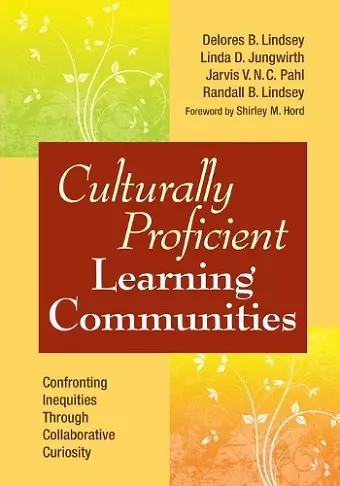Culturally Proficient Learning Communities
Confronting Inequities Through Collaborative Curiosity
Randall B Lindsey editor Delores B Lindsey editor Linda D Jungwirth editor Jarvis VNC Pahl editor
Format:Paperback
Publisher:SAGE Publications Inc
Published:8th Oct '09
Currently unavailable, and unfortunately no date known when it will be back
This paperback is available in another edition too:
- Hardback£62.00(9781412972277)

"Cultural proficiency challenges learning communities to go even deeper when inquiring about student barriers to success. This perspective is necessary to truly address the achievement and expectation gaps in our schools. Before we ask ourselves why our students are not succeeding, we must understand and examine our own perceptions and assumptions about them."
—Timothy A. Bias, Administrator
Pomona Unified School District, CA
Close the achievement gap with equity-focused professional learning communities!
Professional learning communities (PLCs) can be a powerful force for creating equitable, inclusive schools where all students succeed. Integrating the four Tools of Cultural Proficiency with the PLC framework, this relevant guide offers school leaders, district administrators, and staff developers a collaborative approach to address bias and inequity.
Culturally Proficient Learning Communities discusses the impact of our history on cultural understanding and provides a wealth of practical PLC-building strategies—including assessment and inquiry-driven planning, instructional design, curriculum development, coaching, leadership, and shared decision making. The authors examine the goals, purpose, and process of creating and sustaining equity-focused PLCs through:
- Templates, protocols, activities, and rubrics for deconstructing inequity in student achievement
- Stories, tools, and thinking prompts to guide an inside-out transformation toward cultural proficiency
- An extended example of one school district′s journey in becoming a culturally proficient learning community
Schools that view diversity and differences as assets and opportunities will experience stronger holistic growth and increased academic achievement!
"From the very first word, this book provokes thinking and cultural responsibility for educating one’s self and others. The collaboration of the authors and their collective knowledge and experiences both challenge and celebrate every culture’s contribution for every student’s success. The focus on student achievement through the development of cultural proficiency is imperative to creating a community of learners where all students perform at levels higher than before. The end results will not only create culturally proficient educators, but also culturally proficient learning communities that promote and foster global education, collaboration for lifelong learning, and world citizenship." -- Duncan DeBruhl, Assistant Superintendent, Educational Services Department
"This groundbreaking publication is unrivaled in its explication of the role of cultural awareness in ensuring equity for the diverse groups in a school community. The authors deftly provide a treasure trove of tools and ideas that can give direction to educators who seek to support the varied cultures served in their schools. The volume is indispensible for leaders of learning community schools." -- Sylvia Roberts, Associate Professor and Chair of Educational Leadership
"Culturally Proficient Learning Communitieschallenges the paradigm of the current PLC structure. This book brings in a crucial tenet that until now has been left out of the PLC discussion: a willingness to have deeper conversations about issues of equity and access. The new framework is sure to stretch educators as they begin the process of using an inside-out approach to examine personal cultural norms and the way the norms impact leadership and instructional practices." -- Stacie Stanley, Program Director, Office of Equity and Integration
"This book is an affirmation of the combined experiences of the valiant authors and their commitment to the process of positive change within the educational system. This is truly a book that can be used in any school in America, and should be read by every administrator whose vocabulary includes the word ′diversity.′" -- Jean M. Rogers, Educator
"Cultural proficiency challenges learning communities to go even deeper when inquiring about student barriers to success. This perspective is necessary to truly address the achievement and expectation gaps in our schools. Before we ask ourselves why our students are not succeeding, we must examine and understand our own perceptions and assumptions about them." -- Timothy A. Bias, Administrator
"In many schools, professional learning communities are being established to enhance collaboration and communication among faculty. Many of these learning communities are focused on improving teaching and learning, but they continue to struggle to raise achievement for all of their students. This new book challenges professional learning communities to advance to the next level—to tackle the hard issues of diversity in the school setting. In a thoughtful and engaging style, the authors provide guidance for school faculties to close achievement gaps." -- Rose Owens-West, Senior Project Director
"This book asks two questions: What does it take to ensure that all students perform at higher levels than ever before? And what does it take to shake up our own thinking as educators, administrators, and parents in our communities to ensure that all students achieve these high levels of performance in a sustained manner? Whether we are Americans or Africans, answering these questions requires nothing less than that we turn our educational systems as well as ourselves inside out." -- Leloba Molema, Professor
"The authors help us to understand that a professional learning community is not an activity, but a way of being with others as co-learners. This guide includes valuable protocols and activities, as well as real-world scenarios that encourage reflection and allow us as school leaders to construct our own understandings. From the outset, we are gently coached to examine our core beliefs and how they frame our purpose as educators. This reflective process allows us to develop the skills necessary to lead school teams toward cultural proficiency." -- Luis R. Valentino, Director of School Service, and Elizabeth J. Valentino, Assistant Principal
"A book that encourages educators to examine their practices by asking tough questions and providing a road map for collaborative inquiry in straightforward, accessible language." -- Teaching Tolerance magazine
ISBN: 9781412972284
Dimensions: unknown
Weight: 340g
168 pages